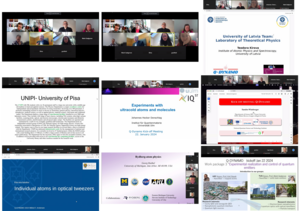Kick-off meeting

On January 22, 2024, a kick-off meeting was held with participation of representatives from the EC Research Executive Agency (REA) and project executors from: University of Latvia, University of Pisa (IT), University of Ulm (DE), University of Parma (IT), University of Michigan (US) and Tokyo University of Science (JP). Due to the time difference, not all overseas partners could join, so the University of Otago (NZ) plans were reported by the project coordinator Teodora Kirova. Opening speeches were delivered by the Rector of the University of Latvia, prof. Indriķis Muižnieks and Director of the project coordinating institute Inga Šīrante
Management Committee (MC) meeting
On March 14, 2025, a Management Committee (MC) meeting was held online with the participation of the EU beneficiaries from University of Latvia (coordinator), University of Pisa (IT), University of Ulm (DE), and University of Parma (IT). During the meeting the team leaders discussed the preparation of the 1st year project report, as well as a made a summary of the completed up-to-date secondments and outlined a detailed secondments plan for year 2025
Mid-term meeting
On 3-4 September 2025, the Mid-term meeting of Q-DYNAMO was held in a hybrid format. Participants from the University of Latvia (coordinator) were present physically, while the rest of the EU beneficiaries - University of Pisa (IT), University of Ulm (DE), and University of Parma (IT), as well as the PA of the project Dr. A.Spahic joined online.
During the meeting the coordinator Dr. T. Kirova presented the overall Q-DYNAMO progress, as well as spoke about ‘Training, Transfer of Knowledge and Networking’, ‘Project Management’, and ‘Impact’.
The WP leaders Prof.D.Ciampini Pisa), Prof.J.H.Denschlag (Ulm) and Prof.S.M.Wimberger (Parma) made a summary of each WP progress, including the publications resulting from the research activities.
All secondees presented shortly the results of their secondments, as well as discussed with the PA their experiences during the secondments, e.g. interaction with the host group members, transfer of knowledge, and intercultural experiences.
Discussions were held concerning the secondments plan for the next two years of the project.

 CONFERENCE
CONFERENCE














